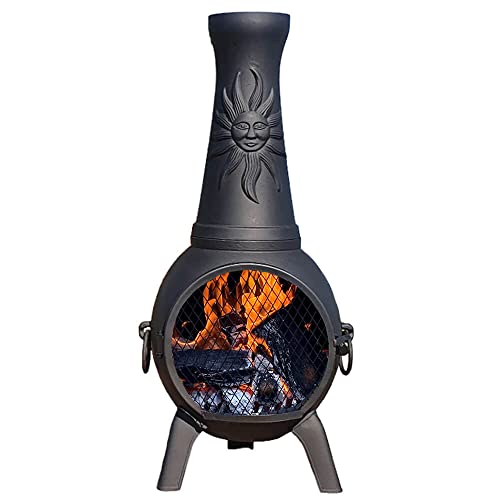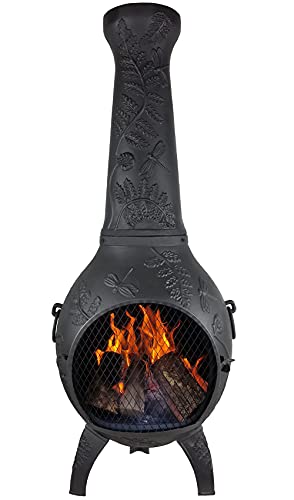9 Lessons Your Parents Teach You About Fire Pits Chimineas
페이지 정보

본문
 Fire Pits Vs Chimineas
Fire Pits Vs ChimineasChimineas have a closed design that stops sparks and embers to escape and which allows smoke to be directed upward. This makes them safer to use around children as well as flammable materials.
Both metal and clay models are available to suit a variety of home and garden styles.
Material
The material used in the making of the chiminea has an effect on its design and performance. Terracotta and clay models are available in a range of styles that be a perfect match for both contemporary and traditional landscapes. Metal chimineas are more practical and are designed to withstand high heat so that they can be used as cooking tools.
Both types of chimineas need some attention to ensure they are functioning their best. They must be cleaned frequently to avoid excessive accumulation of ash and must be protected from freezing and rain temperatures. They should be kept in a location free of flames, and moveable. This is particularly important if nearby plants could be affected by heat or burn.
Chiminesas shouldn't be put outside, like a firepit. It should be put on a flat surface designed for outdoor use, such as pavers or cement. It should be set at least 10 feet away from your home to avoid smoke and fire damage. Chimineas should be positioned in a way that the predominant wind patterns move the smoke away from the house and to the chimney. This will also eliminate unpleasant smells and soot.
A chiminea produces more smoke than a fireplace, so it's not the best choice for large chiminea gatherings or parties that have many people. However, a chiminea is better in terms of smoke control than a fire pit as it is more contained and the chimney stack funnels the smoke upwards instead of outwards into the air.
This wood-burning chiminea made by Wiosi is a great option if you want an chiminea that has a modern look. It features a triangular opening that allows you to fit larger logs and provides 360-degree heat coverage. It also has a rain cap, poker and grate to allow burning smaller pieces of wood.
Style
Chimineas and fire pits can enhance your outdoor living spaces, by creating an inviting place to sit with friends and family on cold evenings. They differ in terms of design, style and purpose. When deciding on the kind of product you want to purchase, think about space, aesthetic preferences and safety issues. Also, think about your lifestyle preferences and assess energy efficiency to find the most suitable option for your budget.
A fire pit is a bowl-shaped foundation with an open top rated chiminea. You can stack wood and a chimney to move smoke upwards. It is recommended to use kiln dried well-seasoned wood for the best performance. You should also keep logs on hand so that you aren't unable to get wood before your guests depart. Chimineas have a more traditional appearance and is designed to be used for cooking as well as heating.
The word big chiminea comes from the Spanish word for chimney. They have broad bases that narrow into a chimney, and are usually adorned with intricate details to add elegance. They are perfect for small outdoor spaces as they take up very small space.
You can find them in a variety of materials, including clay and terracotta for a traditional look and cast iron or steel to ensure durability. Although a terracotta or big clay chiminea is susceptible to cracking at high temperatures, it's the least expensive alternative and has a beautiful vintage look that could add to your property value. Cast iron is more heavy and more robust than other chimineas made from metal but it is more costly.
Some chimineas feature a metal finish with a natural patina of rust. This is a finish that occurs when metal is exposed air and water. The finish is durable and can last for a long time. Cleaning your chiminea regularly with soapy water and a brush is crucial to maintaining it. Moreover, you must protect it from direct water contact after heat to avoid corrosion and rust. Be cautious when moving your chiminea and make sure it is not placed on a surface that may be damaged by the intense heat.
Ventilation
A chiminea's design incorporates the chimney that is used to channel smoke and soot away from those gathered around the fire. It is a great option for small spaces. It also allows for an optimal air circulation, which makes it perfect for outdoor cooking and reducing your chance of a fire destroying your patio furniture or garden.
Chimineas can be constructed from terracotta or clay, or from various metals, including steel and cast iron. The former is less durable and is susceptible to cracking under extreme temperatures or rough handling, while the latter is more durable and available in many attractive finishes that can add an element of rustic to your patio.
Both chimineas, and fire pits, offer warmth and an atmosphere for your backyard. They are also easy to maintain. If you take the right precautions your fireplace or chiminea will last for a long time.
Chimineas are an excellent way to add a touch of elegance to your garden or patio. Their broad base is able to be tapped into narrow chimney. They are an excellent choice for small outdoor spaces where a fireplace might not be a good fit or may block access to other seating areas. Install a chiminea at least 10 feet or more from your home, and in a spot where the winds can blow smoke away.
Chimineas can burn many different woods, including aromatic ones like cedar and hickory. You can also place it so that you can enjoy the fire from one side, while making sure it is hidden from neighbors.
While some may claim that the rise of Fire Pits Chimineas pits has made the chiminea obsolete, it's important to think about your own needs when deciding between the two. Each kind of fire feature offers distinct advantages. The bowl-shaped open design allows you to create bigger logs that radiate warmth in a 360-degree circle. Chimineas, on the contrary, have a more enclosed bottom that directs heat downwards. Both are great options to add a sense of atmosphere to your garden, the right choice will depend on what you'll use it for.
Heat distribution
Chimineas are enclosed structures that optimises heat distribution. This helps conserve resources and reduces environmental impact, particularly when compared with fire pits. Both types create smoke that is made up of particles of matter as well as other harmful chemicals that can degrade air quality and aggravate respiratory conditions. Several factors influence the amount of smoke that is produced such as the type and amount of moisture of the wood, the weather conditions, and how long the fire burns. The best way to minimise the effects of this is to make use of dry, seasoned wood and chiminea designs that are efficient.
Contrary to fire pits and fire pits, chimineas come with a chimney stack that funnels the smoke upward. This keeps the flames away from people and other objects that can ignite and minimizes soot and smoke. As a result, they're ideal for outdoor seating where guests can enjoy a relaxing time in close proximity. Additionally their curving walls and accessible access makes it easier to tend to the fire without disrupting conversation or creating smoke inhalation.
They're also more sturdy than fire pits which are susceptible to moving with the wind and create higher risk of injury due to their open flames and shifting direction of smoke. However, they don't provide as much direct heat for cooking as fire pits, since they're able to only support small briquettes and logs.
Both fire pits and chimineas require some initial setup before you can use them. Chimines require more preparation, like placing gravel or sand at the bottom of the structure before its first use. However, this isn't an requirement with the fire pit that only requires you to add fuel and begin the fire.
Both chimineas, as well as fire pits, need to be placed on a grate of sand, or a bed of sand in order to prevent damage to the flooring of your patio. Additionally, chimineas can be heavy, some weighing up 200 pounds and aren't difficult to move once they're set. It is also necessary to regularly spray your chiminea with high-temperature paint in order to avoid corrosion and preserve its original look. A fire pit is able to be moved easily, making it more flexible for different spaces.

- 이전글15 Unquestionable Reasons To Love Search Engine Optimization 24.10.16
- 다음글Are Chiminea Fire Pit The Greatest Thing There Ever Was? 24.10.16
댓글목록
등록된 댓글이 없습니다.

